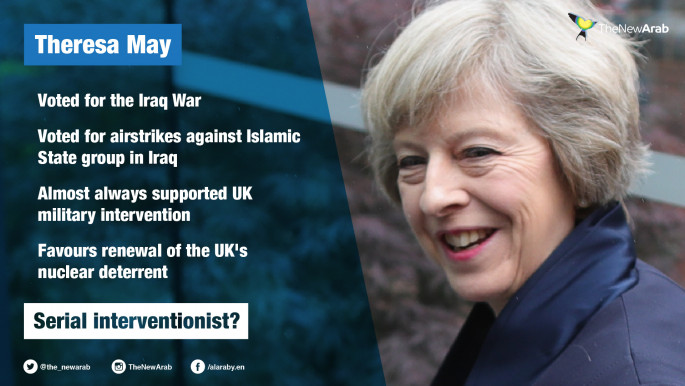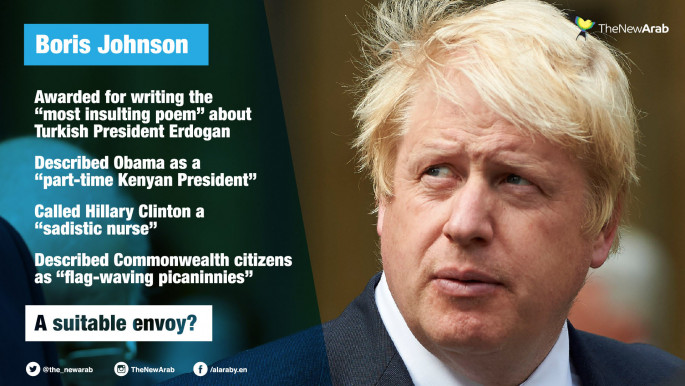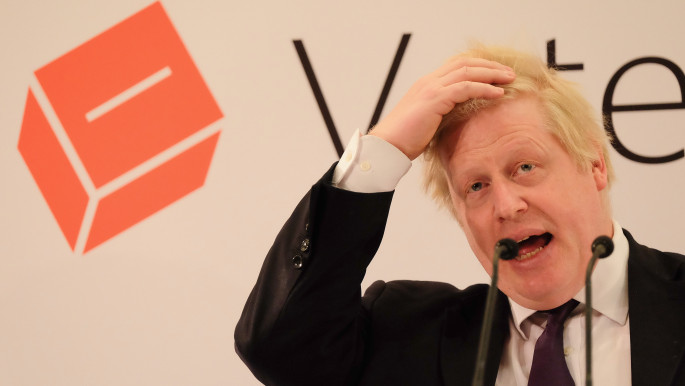May and Johnson's foreign policy: a disaster-in-waiting?
Having restored a semblance of calm within the ruling Conservative Party, Theresa May has entered the stage as the UK's new prime minister, faced with taking Britain through the murky waters that may lie beyond Europe.
With such dramatic change underway, what does this mean for the UK's foreign policy, and indeed for the Middle East?
Theresa May - Britain's new 'Iron Lady?'
Theresa May assumed the role of prime minister after serving as British Home Secretary for six years.
During this stretch, May carved herself out a reputation as a stern commander with little time for the flashing cameras of the press. She lasted longer in this post than most in one of the cabinet's most unforgiving roles, at a time when the UK faced huge social strains through austerity and heightened fears of terrorism.
It is for perhaps for this reason that comparisons between May and Margaret Thatcher - the original "Iron Lady"- are being reinforced, beyond superficial comparisons between the UK's first and second female Conservative prime ministers.
May's reputation for having a firm approach is also widely known among her colleagues. Recently released candid footage of Tory grandee Kenneth Clarke, a politician who served under Thatcher, showed the former minister of various portfolios describing her punishing business style.
"Theresa is a bloody difficult woman, but you and I worked with Margaret Thatcher," Clarke said to former foreign minister Sir Malcolm Rifkind at the studio of Sky News in London.
After a brief chuckle, Clarke also added that "she's been at the Home Office far too long, so I only know in detail what her views are on the Home Office.
"She doesn't know much about foreign affairs."
 |
Out of Europe
In line with May's repeated affirmation that "Brexit means Brexit", leading Eurosceptics have been awarded top jobs in her cabinet, with MP David Davis in charge of leaving the EU and leading Brexiteer Boris Johnson as Foreign Minister.With this line-up, May has shown her seriousness about a British future beyond Europe. This, however, has come at some expense to the Anglo-American relationship, as Washington opposed the UK's exit from the EU.
As the UK draws closer to going it alone in the world, this may certainly add a dose of caution to British foreign policy, regardless of the jingoism touted by some Brexiteers.
A serial interventionist?
In Parliament, May has almost always voted in favour of using British military forces in combat operations overseas. This includes support for the Iraq war in 2003, the no-fly zone imposed on Libya under Muammar Gaddafi in 2011 and airstrikes against the Islamic State Group in Iraq and Syria.
While she has backed US-UK foreign interventions in the past, May may have to balance appeasing an increased American appetite for war under Hillary Clinton with the reality of Britain's new role in the world.
If this new position entails a strengthening of Trans-Atlantic ties - which would be helped along by a jilted and insulted Europe - Britain may back even more foreign adventures in order to curry favour in Washington.
Boris Johnson - More clown than clout?
In appointing Boris Johnson as foreign secretary, May surprised many due to the former London mayor's fall from grace after the EU referendum. After failing to stand for the role of PM amid the post-Brexit fallout, many came to view Johnson as an opportunistic schemer who lacked the conviction to see through his own tempestuous plans.

Prior to his reinvention as a champion of British sovereignty, Boris had built up a reputation as a scruffy haired politician with a penchant for inappropriate comments - including towards world leaders.
Few friends in Washington
During President Barack Obama's recent visit to Britain, Johnson described the US commander-in-chief as a "part-time Kenyan president," in reference to his heritage, and said that this had prejudiced Obama with an "ancestral dislike of Britain".
Johnson later apologised for his comments, and on Wednesday said that "the United States of America will be in the front of the queue" of those he will be saying sorry to.
Among other things said about Donald Trump, Johnson also remarked that "the only reason I wouldn't visit some parts of New York is the real risk of meeting Donald Trump."
A British chauvinist?
While the mentioned mishaps may mean that Johnson will seek to appease his new partners across the Atlantic, there are other reasons to suggest that the new foreign minister is grasping onto old delusions of British imperial grandeur.
In an article written for the Spectator in 2002, he said Africa "may be a blot, but it is not a blot on our conscience. The problem is not that we were once in charge, but that we are not in charge anymore."
 |
| Not up for the job: Johnson was criticised for backing out of the Conservative Party's leadership race after heading the 'leave' campaign [Getty] |
This comment may betray what Johnson really thinks of the vast Commonwealth that Britain once controlled, which includes many parts of the Middle East.
With regards to this region, Johnson may already be at a disadvantage for dealing with the Syrian crisis, after winning a contest for writing the most insulting poem about Turkish President Recep Tayyip Erdogan.
In a crudely-worded limerick, Johnson described the Turkish president eloping with a goat.
If Johnson is to cooperate with his Turkish counterparts to resolve Syria's refugee problem and the regional conflict, his past comments will certainly not help in this.
Furthermore, the new foreign secretary wrote in 2015 that the UK should "do a deal with the Devil," and "work with Vladimir Putin and Bashar al-Assad in Syria" to defeat IS.
This of course runs contrary to the British government's line on Syria, and ignores Damascus' cynical use of the terror group to make gains against opposition factions.
On Palestine, Johnson has also openly opposed the Boycott Divestment and Sanctions campaign against Israel, dismissing it as a "bunch of, you know, corduroy jacketed academics" while on a trip to Tel Aviv.
"I cannot think of anything more foolish than to say you want to have any kind of divestment or sanctions or boycott against a country that, when all is said and done, is the only democracy in the region, is the only place that has, in my view, a pluralist open society," he told reporters.
Given such brazen views on Middle Eastern affairs - it is difficult to see how Johnson can position himself as a respected figure amid the tough political wrangling that surrounds the region's affairs.
Some observers, however, have long held to the belief that Johnson is a shrewd politician who used the guise of a fool as a tactical ploy.
How this will play out on the world stage is yet to be seen, however with Britain embarking on a journey of huge uncertainty, Johnson will certainly need more friends than foes - leaving little room for the flippant pot-shots and insults.

![President Pezeshkian has denounced Israel's attacks on Lebanon [Getty]](/sites/default/files/styles/image_684x385/public/2173482924.jpeg?h=a5f2f23a&itok=q3evVtko)



 Follow the Middle East's top stories in English at The New Arab on Google News
Follow the Middle East's top stories in English at The New Arab on Google News


